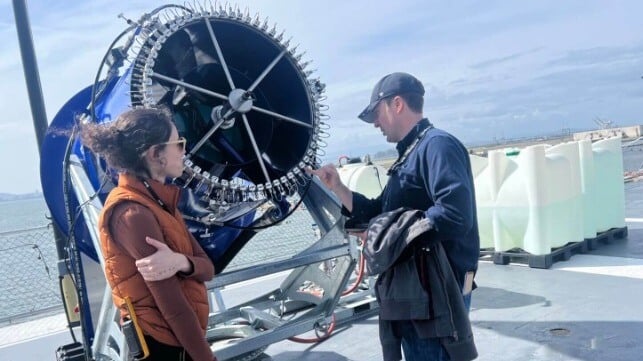City of Alameda Halts Climate Tech Experiment Aboard a WWII Carrier

The City Council in Alameda, California has put an end to a scientific experiment aboard the WWII carrier USS Hornet, a museum ship permanently berthed at Old Alameda Point.
Last year, a team of researchers from the University of Washington and funders at nonprofit SilverLining arranged to use the deck of the Hornet to test a cloud-brightening machine - a device designed to emit aerosols that promote water droplet formation and create reflective white clouds, partially shielding a small area from the sun's heat. Their plan was to put the small nozzle-like device aboard Hornet, run it for up to a year and collect data on how well it worked outside of the lab. As a test-size model, it is not expected to have measurable local effects, and its emissions are below the minimum threshold for environmental permitting.
However, some of Alameda's citizens objected to the testing, for two separate reasons. First, some residents expressed concern that the mist could have health effects. In early April, the city of Alameda ordered the experiment paused until it had further information on the impact on health and safety. After a brief period of research, the city managers determined that the tests did not post any measurable risk to the health of the surrounding community or wildlife, since the contents of the device's spray were naturally-occurring and similar to seawater.
The second reason is more complex, and reflects a matter of disagreement in the environmental community. Cloud brightening is a form of geoengineering - a deliberate intervention to slow down warming, whether or not humanity stops emitting large amounts of carbon. Some climate action groups oppose geoengineering on principle, arguing that it creates an excuse for inaction on carbon and uses up funding that could be spent on developing green energy alternatives. It could also have unpredictable consequences for natural ecosystems.
Researchers in the geoengineering field argue that it may be needed as a backup if the world's nations fail to follow through on their Paris commitments, and could help mitigate the impact of an already-changing climate on the developing world. If used at massive scale - for example, on thousands of oceangoing vessels - it could have a meaningful global impact.
This week, the Alameda City Council decided that it would not be taking any chances with the project. On Wednesday morning, the five council members voted to prohibit further testing aboard USS Hornet, despite the report from their staff advising that the process was safe. Among other issues, the council was concerned that its members had never been informed, and that local leaders found out about the project after the fact from media reports.
"Was it intentional? Was it an oversight?" Alameda Mayor Ezzy Ashcraft said, speaking to the East Bay Times. "The experiment was shrouded in secrecy, then it turns out it was in a controversial field."
Project leaders have denied any attempts at secrecy, and they emphasized that they had set up the test in an open, public space - USS Hornet, which they described as "unparalleled in its potential to increase access and equitable engagement for all people."
